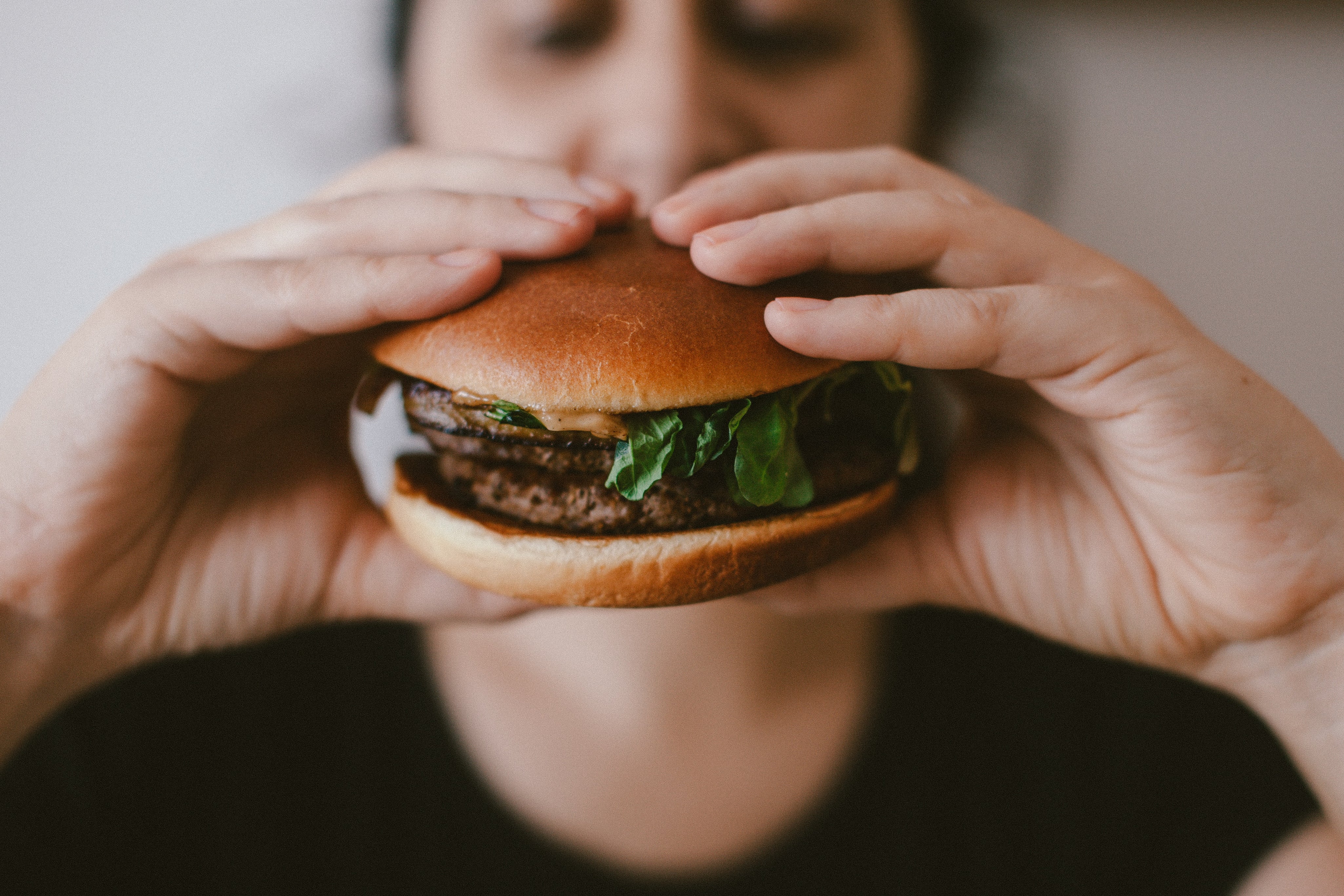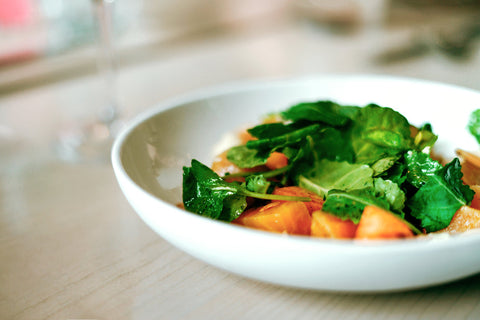Why Am I So Hungry on My Period? Causes and Remedies.

Dealing with hunger during your menstrual cycle is a common experience for many women. It's not unusual to find yourself reaching for snacks more often or craving certain foods during this time. In this blog post, we explore the reasons you feel hungry on your period, and discuss possible solutions and remedies.
What is the menstrual cycle?
The menstrual cycle is a natural process that occurs in women of reproductive age. It involves the release of an egg from the ovaries, thickening of the uterine lining, and preparation for pregnancy. On the other hand, premenstrual syndrome (PMS) refers to the physical and emotional symptoms that occur before your period. These symptoms can include bloating, period pain, mood swings, fatigue, menstrual cramps, and food cravings.
When do period cravings start and stop?
Period cravings usually begin a week before your period starts, and usually stop after the first few days of your period. This can vary from person to person, but it generally aligns with the hormonal fluctuations that occur during the menstrual cycle.
Why do I feel hungrier on my period?
A 2016 study looked at the eating habits, weight fluctuations, and hormone levels of 30 participants ages 18-45. The study found that women ate significantly more before their periods. But what causes this?
Hormonal Causes
During your menstrual cycle, the levels of hormones like estrogen, progesterone, and cortisol fluctuate. These hormonal changes have an impact on your appetite.
Estrogen
Estrogen is a key hormone involved in the menstrual cycle. Its levels fluctuate throughout the month, reaching their highest point just before ovulation, and falling in the premenstrual phase. Estrogen has an impact on how your appetite works by changing the production of certain hormones, such as leptin and ghrelin.
- Leptin: Leptin is a hormone produced by fat cells that regulates energy balance and appetite. Estrogen enhances the production of leptin, which signals to the brain that you are full and helps control food intake. A 2021 study showed significant changes in leptin to support this.
- Ghrelin: Ghrelin is a hormone produced by the stomach that stimulates hunger. Estrogen tends to decrease ghrelin levels, reducing appetite and food cravings.
During the premenstrual (PMS) phase, when estrogen levels drop, the decreased production of leptin and ghrelin may cause increased cravings.
Progesterone
Progesterone is another hormone involved in the menstrual cycle, particularly in the second half after ovulation. Progesterone levels increase during this phase and then drop if pregnancy doesn't occur.
Progesterone has been associated with an increase in appetite and food consumption. This effect may be related to its impact on neuro-transmitters and brain regions involved in food regulation.
Progesterone can also cause fluid retention and bloating, which may make you feel more hungry.
Cortisol
Cortisol, commonly known as the stress hormone, can also change your appetite and cause food cravings during your period. Cortisol levels fluctuate throughout the menstrual cycle, and elevated levels can stimulate appetite, particularly for high-calorie and comfort foods.
During the premenstrual phase, when emotional changes are higher, increased cortisol levels and stress may cause food cravings and emotional eating.
Increase in energy used
Your body's energy expenditure may increase slightly during your period due to the changes happening. This increase in energy expenditure may make you feel hungrier than usual.
PMS symptoms
Premenstrual syndrome (PMS) symptoms can impact your daily life, including sleep quality, exercise routine, and wellbeing. This, in turn, can contribute to increased appetite during your period. Let's explore how PMS symptoms like poor sleep and lack of exercise can influence your appetite.
Poor sleep
During the premenstrual phase, hormonal fluctuations can affect your sleep pattern, and cause insomnia, restless sleep, or decreased sleep duration.
When your sleep pattern changes, it can disturb the balance of hunger and fullness cues. This can make you crave comfort foods to compensate for fatigue and low energy levels.
Lack of exercise
PMS symptoms like fatigue, mood changes, and physical discomfort may make it hard to maintain regular exercise during your period. Factors such as abdominal cramps, bloating, and decreased energy levels can contribute to a decrease in physical activity. This can influence appetite in the following ways:
- Reduced calorie expenditure: Physical activity contributes to energy expenditure, helping balance the calories consumed. When exercise levels decrease, the number of calories burned also decreases, potentially creating an energy imbalance.
- Psychological effects: Exercise is known to improve mood and reduce stress. When you stop exercising during your period, you can experience mood swings or increased stress, which can lead to emotional eating.
It's important to recognise the potential impact of poor sleep, lack of exercise, and other PMS symptoms on your appetite. Taking steps to sleep well, manage stress levels, and do gentle exercise (like stretching or yoga) can help reduce period cravings.
Is it normal to feel more hungry on my period?
Yes, it is normal to feel more hungry on your period. Many women experience increased appetite and cravings during this time. However, the intensity of hunger can vary from person to person. If your hunger is excessive or you have other severe symptoms, speak with a doctor to rule out any underlying conditions.
According to John Hopkins, hormone changes can cause a serotonin deficiency just before your period. Serotonin is a natural substance in the brain that can affect your mood and cause physical symptoms. What can make you feel better? Chocolate of course!
"Chocolate makes you feel good," said Dr. Klein. "The fat and sugars help replenish insulin and serotonin levels in the brain, elevating your mood."
How to control period hunger

Looking for ways to control your hunger during your period? These top four tips are most commonly recommended:
Eat a balanced diet
Wondering what to eat on your period? Eating a balanced diet rich in whole grains, lean proteins, fruits, and vegetables can regulate blood sugar levels and manage hunger. Avoid processed foods, and include foods high in fibre to promote fullness and reduce cravings. A well balanced diet can ease period cramps and reduce PMS symptoms, too.
Stay hydrated
Drinking plenty of water throughout the day can help control hunger. Sometimes thirst can be mistaken for hunger, so staying hydrated can help stop unnecessary snacking.
Mindful eating
Trying mindful eating techniques, such as eating slowly, can help you become more aware of your hunger and fullness cues. This can prevent overeating and promote a healthier relationship with food.
Regular exercise
Physical activity can help regulate your appetite and improve your overall well-being. Exercise has been shown to reduce PMS symptoms and alleviate mood swings, which can help control hunger.
Stress management
Stress can influence your appetite and trigger emotional eating. Try some techniques, such as meditation, deep breathing exercises, or taking part in activities you enjoy, to help reduce stress levels.
Seek support
Share your experiences and seek support from friends, family, or online communities. Knowing that others may be going through similar situations can provide emotional support and helpful tips for managing period hunger.
Looking for solutions for period bloating?
Period bloating is a common symptom experienced by many women during their menstrual cycle, and increased cravings can make this worse. While bloating can be uncomfortable, there are ways to reduce the discomfort and have a more comfortable period. If you're wondering how to stop period bloating, why not consider switching to reusable period pants? Our Nustretch period pants are designed to adapt to fluctuating sizes and provide comfort during bloating.
How can period pants help with bloating?

Fluxies Nustretch period pants are specifically designed to address the challenges of bloating and fluctuating sizes during your period. Here's how they can help:
- Stretchy and comfortable: Our period pants are made from stretchy fabrics that comfortably adapt to your body during your menstrual cycle. The stretchiness of the fabric allows for a seamless fit, even when experiencing bloating.
- Multi-size coverage: The design of our NuStretch period pants means they stretch across multiple sizes and adjust to your body. Whether you experience bloating or weight fluctuations, our period pants will adapt to ensure a comfortable fit.
- Breathable and absorbent: Fluxies period pants are designed to be breathable and provide reliable absorption. This can help manage any excess moisture caused by sweating or water retention, reducing period bloating and keeping you comfortable.
- Eco-friendly and cost-effective: By switching to reusable period pants, you can reduce your environmental impact. They can also be a cost-effective choice in the long run, as you won't need to keep buying disposable products.
Period bloating is a temporary symptom, and by making lifestyle adjustments, you can reduce discomfort and have a more comfortable period. Remember to choose products and practices that align with your preferences and needs for the best possible results.
Final thoughts
Experiencing increased hunger during your period is a common occurrence due to hormonal fluctuations and other factors. By understanding the causes and making changes to your lifestyle, you can better manage and control your hunger during this time. Remember to listen to your body, nourish it with healthy foods, and speak to your doctor if your symptoms become unbearable.
RELATED POSTS
What Are Period Cravings and Why Do We Get Them
What is PMS? Understanding Premenstrual Syndrome.
What Menstrual Cycle Hormones Do for Your Body & Your Mood
What Causes Period Bloating and Tips on How to Reduce It
Everything You Should Know About Water Retention and Periods
The Best Vegan Foods That Increase Iron For An Easier, Healthier Period



